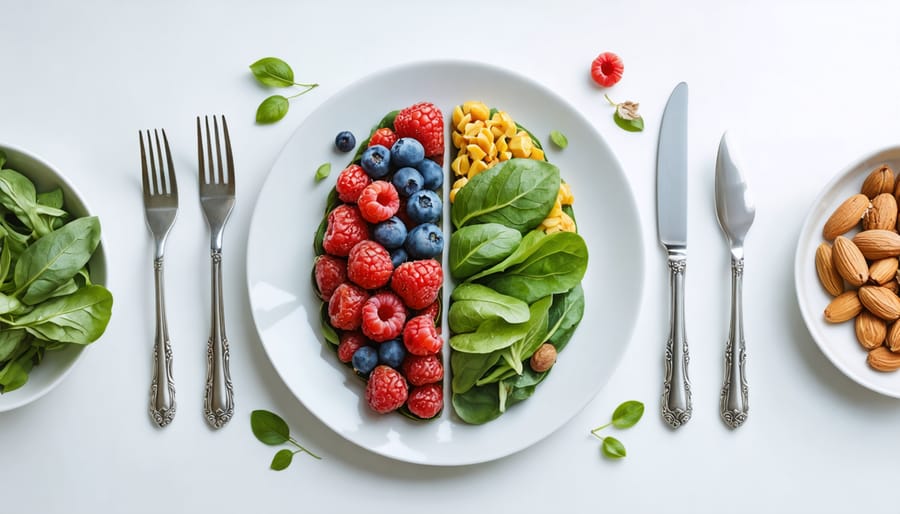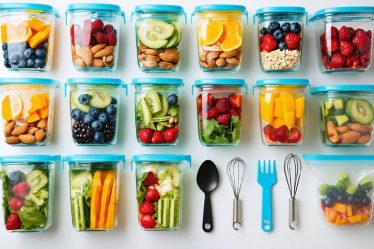
Transform your mental and physical wellbeing with this scientifically-backed 7-day meal plan designed to nourish both body and mind. By combining Mediterranean-inspired ingredients with mindful eating habits, this comprehensive guide helps you create lasting changes in your relationship with food while boosting cognitive function and emotional balance.
Studies show that what we eat directly impacts our mental clarity, mood, and overall brain health. This week-long journey introduces you to brain-boosting foods like omega-rich fish, colorful berries, leafy greens, and wholesome nuts – all carefully scheduled to maximize their benefits throughout your day. Each meal has been thoughtfully crafted to provide the perfect balance of nutrients that support mental acuity while remaining deliciously satisfying.
Whether you’re looking to enhance focus, reduce stress, or simply establish healthier eating patterns, this mind diet meal plan offers a practical roadmap to better mental wellness through intentional nutrition. You’ll discover how simple food choices can create profound changes in how you think, feel, and function – all while enjoying deeply nourishing meals that celebrate both flavor and mindfulness.
Let’s begin this transformative week of eating for both body and mind, with detailed daily menus that make healthy choices effortless and enjoyable.
The Science Behind Mindful Eating
Have you ever noticed how different you feel when you eat while scrolling through your phone versus when you’re fully present with your meal? The science behind mindful eating reveals fascinating connections between our eating habits and brain function that might surprise you.
When we practice mindful eating, our bodies activate the parasympathetic nervous system – often called our “rest and digest” mode. This state naturally reduces stress hormones like cortisol while increasing the production of feel-good neurotransmitters such as serotonin. I remember when I first started practicing mindful eating; the simple act of taking three deep breaths before meals made such a noticeable difference in how I felt afterward.
Research shows that mindful eating can actually change how our brains process food signals. When we eat mindfully, we’re more tuned in to our body’s hunger and fullness cues, thanks to better communication between our gut and brain. This improved awareness helps prevent overeating and promotes better digestion.
The benefits extend beyond just our eating habits. Regular mindful eating practices have been linked to reduced anxiety, better sleep quality, and improved overall mood. It’s like giving your brain a mini-meditation session with every meal! Many of my readers have shared how incorporating mindful eating has helped them break free from emotional eating patterns and develop a healthier relationship with food.
What’s particularly interesting is how mindful eating affects our food choices. When we’re present and aware, we’re more likely to choose foods that truly nourish our bodies and minds. Studies show that people who practice mindful eating naturally gravitate toward more nutrient-dense foods, not because they’re forcing themselves, but because they’re more in tune with how different foods make them feel.
Remember, mindful eating isn’t about perfect practice – it’s about creating moments of awareness that gradually become habits. Even taking just one mindful bite at the beginning of your meal can start shifting your brain chemistry in a positive direction.

Preparing for Your Mind Diet Journey
Kitchen Essentials
Setting yourself up for success starts with having the right tools and ingredients in your kitchen. To make the most of your mindful cooking habits, stock up on these essentials: a good set of measuring cups and spoons, a sharp chef’s knife, a sturdy cutting board, and quality food storage containers for meal prep.
For ingredients, keep your pantry stocked with extra virgin olive oil, whole grains (like quinoa and brown rice), nuts (especially walnuts), and an array of dried herbs and spices. Your fridge should always have leafy greens, colorful vegetables, berries, and lean proteins. Don’t forget to include Mediterranean diet staples like fish, legumes, and Greek yogurt.
Pro tip: I love using a weekly meal planning notepad to stay organized and minimize waste. Trust me, it’s a game-changer!

Mindful Shopping Guide
Transform your grocery shopping into a mindful practice by focusing on brain-boosting ingredients and intentional choices. Start by creating a detailed shopping list organized by food groups, ensuring you include plenty of colorful fruits, leafy greens, and omega-3-rich foods.
Before heading to the store, take a few deep breaths and set your intention for nourishing both body and mind. Shop the perimeter of the store first, where you’ll find fresh produce, lean proteins, and whole foods. When selecting items, engage your senses – notice the vibrant colors, fresh aromas, and varied textures.
Keep these mindful shopping tips in mind:
– Choose organic when possible, especially for the “dirty dozen”
– Read labels mindfully, focusing on whole food ingredients
– Pick seasonal produce for maximum nutrition and flavor
– Stock up on nuts, seeds, and berries for healthy snacking
– Select high-quality proteins like wild-caught fish and free-range eggs
Remember to bring reusable bags and stay present during your shopping experience. This mindful approach helps you make better choices while creating a more enjoyable and purposeful shopping routine.

Your 7-Day Mind Diet Meal Plan
Monday: Clarity & Focus
Start your week with intention by nourishing both your mind and body. For breakfast, enjoy a brain-boosting bowl of steel-cut oats topped with blueberries, walnuts, and a drizzle of honey. These ingredients are rich in antioxidants and omega-3s, perfect for enhanced cognitive function.
For lunch, prepare a colorful Mediterranean quinoa bowl with leafy greens, cherry tomatoes, chickpeas, and olive oil dressing. This combination provides sustained energy to keep your mind sharp throughout the afternoon.
End your day with grilled salmon, roasted sweet potatoes, and steamed broccoli. This dinner is packed with nutrients that support mental clarity and focus.
Between meals, practice these mindfulness exercises:
– Morning meditation (10 minutes)
– Midday desk stretching (5 minutes)
– Evening gratitude journaling (5 minutes)
Stay hydrated by sipping on green tea throughout the day instead of coffee. The L-theanine in green tea promotes calm alertness without the jitters.
Pro tip: Prep your meals the night before to start your Monday stress-free. When your mind isn’t clouded with decision-making about food, you can focus on what truly matters in your day.
Tuesday: Energy & Balance
Today’s focus is on maintaining steady energy levels while nurturing your mind-body connection. Start your morning with a nourishing breakfast of overnight oats topped with blueberries and walnuts – both excellent brain-boosting foods. The complex carbohydrates provide sustained energy, while omega-3 rich nuts support cognitive function.
For lunch, enjoy a colorful Mediterranean quinoa bowl with leafy greens, chickpeas, and olive oil. This combination delivers protein and healthy fats that help stabilize blood sugar and maintain focus throughout the afternoon. Remember to take mindful breaks between tasks, practicing deep breathing to maintain your energy balance.
Your dinner should feature fatty fish like salmon, paired with roasted sweet potatoes and steamed broccoli. This nutrient-rich combination supports both physical stamina and mental clarity. Before bed, try a small handful of almonds or a cup of chamomile tea to promote relaxation.
Today’s mindful eating practice: Before each meal, take three deep breaths and notice the colors and textures of your food. This simple ritual helps activate your parasympathetic nervous system, optimizing digestion and nutrient absorption while fostering a deeper connection with your food.
Wednesday: Creativity & Joy
Let’s spark joy and creativity with foods that naturally enhance your mood and cognitive flexibility. Start your morning with a colorful acai bowl topped with fresh berries, coconut flakes, and a sprinkle of cacao nibs – not just Instagram-worthy, but packed with antioxidants that support brain function. For a mid-morning boost, try golden milk (turmeric latte) with a handful of walnuts, known for their brain-boosting omega-3s.
Lunch calls for a vibrant Mediterranean quinoa bowl with roasted bell peppers, chickpeas, and fresh herbs. The combination of complex carbs and protein helps maintain steady energy levels, while the rainbow of vegetables provides mood-enhancing nutrients.
For dinner, embrace the joy of cooking with a sheet pan of roasted salmon, sweet potatoes, and Brussels sprouts drizzled with olive oil and herbs. This meal is rich in vitamin D and omega-3s – essential nutrients for maintaining positive mood and mental clarity.
End your day with a small square of dark chocolate (70% or higher) and chamomile tea. This combination helps you unwind while the flavonoids in dark chocolate support cognitive function and creativity.
Thursday: Stress Relief
When stress levels rise, your food choices can make a significant difference in how you feel. Start your Thursday with a soothing cup of chamomile tea alongside a bowl of warm oatmeal topped with banana slices and a drizzle of honey. These natural stress-relievers help promote relaxation while nourishing your body.
For lunch, embrace the calming properties of omega-3 rich foods with a colorful salmon salad featuring dark leafy greens, avocado, and walnuts. As you eat, practice mindful eating by taking slow, deliberate bites and focusing on the flavors and textures of each ingredient.
Your afternoon snack should include magnesium-rich foods like a small handful of dark chocolate-covered almonds. This combination not only satisfies sweet cravings but also helps regulate stress hormones naturally.
End your day with a comforting dinner of turkey and sweet potato curry. Turkey contains tryptophan, which helps produce serotonin, while sweet potatoes provide complex carbs that help stabilize mood. Remember to dim the lights, put away your phone, and create a peaceful environment while enjoying your evening meal. This mindful approach to eating helps signal to your body that it’s time to wind down and relax.
Friday: Memory & Learning
Friday’s menu is all about feeding your brain’s memory center! Start your day with a bowl of steel-cut oats topped with blueberries and walnuts – a powerful trio for cognitive function. Mid-morning, snack on dark chocolate-covered almonds, which aren’t just delicious but also support memory formation.
For lunch, enjoy a colorful quinoa bowl with wild-caught salmon, leafy greens, and avocado. This omega-3 rich meal helps maintain brain cell integrity and supports learning capacity. Your afternoon pick-me-up could be green tea paired with a handful of pumpkin seeds, known for their brain-protective zinc content.
Round off your day with a Mediterranean-style dinner of herb-roasted chicken, roasted Brussels sprouts, and sweet potato. While enjoying your meals, practice memory-enhancing activities like learning a new language over lunch or doing crossword puzzles during your afternoon tea break.
Pro tip: Try the “memory palace” technique while preparing your meals – associate each ingredient with a specific location in your house. It’s a fun way to combine cognitive exercise with cooking!
Saturday: Social Connection
As we wrap up our week, Saturday is all about nourishing both body and soul through shared experiences. There’s something magical about breaking bread with others – it’s a practice that humans have cherished for millennia. Start your day by inviting friends or family for a mindful breakfast gathering. Prepare a colorful spread of brain-boosting foods like whole grain pancakes topped with berries, or a Mediterranean-style brunch with olive oil-drizzled avocado toast and fresh fruits.
During your shared meal, practice mindful communication. Put away phones and truly engage with those around you. Ask meaningful questions, share stories, and really listen to the responses. This combination of nutritious food and genuine connection creates a powerful boost for your mental wellbeing.
For dinner, consider hosting a potluck where everyone brings a mind-healthy dish. This not only provides variety but also creates an opportunity to share recipes and tips. Remember, laughter and good conversation are just as nourishing as the food on your plate. End the evening with a calming herbal tea ritual, sharing gratitude moments from the week.
Sunday: Reflection & Reset
Sundays are your opportunity to pause, reflect, and reset for the week ahead. Start your day with a nourishing breakfast bowl of Greek yogurt topped with brain-boosting berries, walnuts, and a drizzle of honey. This gentle combination provides both comfort and clarity.
For lunch, enjoy a light Mediterranean quinoa salad with leafy greens, cherry tomatoes, and olive oil dressing. This meal supports both physical and mental detoxification while maintaining steady energy levels throughout the day.
As you prepare your evening meal of herb-roasted salmon with steamed vegetables, take time to journal about your week’s journey. What mental shifts did you notice? Which meals made you feel most energized? Use these insights to adjust next week’s meal choices.
Remember, this isn’t just about food – it’s about creating mindful eating habits that serve your mental wellbeing. End your day with a calming cup of chamomile tea and set positive intentions for the week ahead. Your mind and body will thank you for this thoughtful reset ritual.
Mindful Eating Practices
Have you ever noticed how quickly you finish your meals, barely tasting the food in front of you? I used to be the same way until I discovered mindful eating practices that transformed not just my meals, but my entire relationship with food.
Let’s make your dining experience more intentional with these simple yet powerful techniques. Start by creating a peaceful eating environment – turn off the TV, put away your phone, and set your table thoughtfully. Even a simple placement of a flower or a pretty napkin can elevate your mealtime experience.
Before taking your first bite, take three deep breaths. Notice the colors, textures, and aromas of your food. This brief pause helps transition your mind from the busy day to the present moment. As you begin eating, try to chew each bite at least 20 times. I know it sounds like a lot, but this simple practice helps you truly taste your food while aiding digestion.
Pay attention to your body’s signals. Are you eating because you’re hungry, or is stress driving you to the kitchen? Learn to distinguish between emotional and physical hunger. When you feel satisfied – not stuffed – place your utensils down. Remember, it takes about 20 minutes for your brain to register fullness.
Practice gratitude during your meals. Think about where your food came from, the farmers who grew it, and the effort that went into preparing it. This perspective shift helps create a deeper appreciation for each meal and naturally slows down your eating pace.
Keep a mindful eating journal for the first few days of your mind diet journey. Note not just what you eat, but how you feel before, during, and after meals. Did certain foods energize you? Did others make you feel sluggish? This awareness will help you make better food choices aligned with your body’s needs.
Remember, mindful eating isn’t about perfect practice – it’s about progress. Some days you’ll be more present than others, and that’s completely okay. The goal is to gradually build a more conscious relationship with your food, one meal at a time.

Embarking on this 7-day mind diet journey is more than just following a meal plan – it’s about creating a mindful relationship with the food you eat and the way you nourish both body and mind. As you’ve seen throughout this guide, combining nutritious meals with mindful eating practices can truly help you transform your relationship with food in remarkable ways.
Remember, this isn’t about perfection – it’s about progress. Each mindful bite you take, every moment you spend preparing your meals with intention, and all the times you pause to appreciate your food are steps toward a more balanced and conscious approach to eating.
The benefits you’ll experience extend far beyond the kitchen. From improved digestion and better food choices to reduced stress around eating and a deeper connection with your body’s needs, this mind diet approach creates ripples of positive change throughout your daily life.
As someone who’s witnessed countless women discover the joy of mindful eating, I can tell you that the journey ahead is both exciting and transformative. Start small, perhaps with just one mindful meal a day, and gradually build upon your success. Be patient with yourself, celebrate your progress, and know that you’re part of a community of women who are all working toward similar goals.
Why not begin your journey today? Your future self will thank you for taking this important step toward a more mindful, nourishing relationship with food. Remember, every meal is an opportunity to practice presence and make choices that serve both your body and mind.


